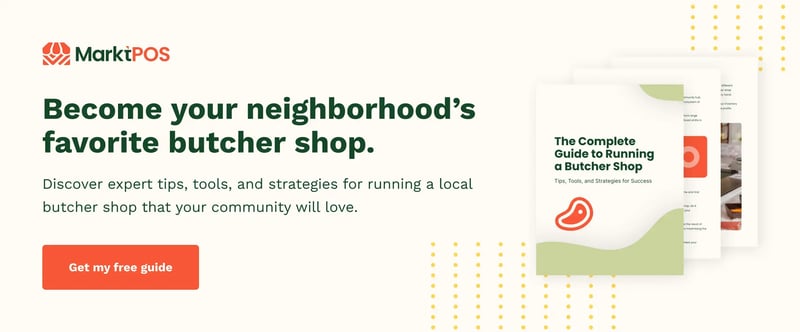How To Get a Butcher License: 5 Steps & Tips
Across the U.S., specialty butcher shops are gaining popularity by offering fresh cuts, personal service, and a level of quality and variety that big-box grocery stores often can’t match. State licensing helps keep these smaller businesses safe, sanitary, and legally compliant.
You’ll need the right butcher license to open your shop. The type you need — and how to get it — depends on your state and the services you provide. To help you get started, here are five steps and tips to guide you from application to opening day.
1. Check Your Local Requirements
Before you can apply for a butcher license, you need to understand which rules apply in your state and county. Licensing authority often starts at the local level, and requirements can vary based on where your shop is located.
Start with these steps:
-
Know what licenses and permits you need: Research the requirements for your state, which are often listed on the health department or agriculture agency’s website. For example, in Texas, butchers typically need a retail food permit to sell to customers, while wholesale or slaughter operations require a state Grant of Inspection.
-
Research business licensing rules: Check if you need a general business license and whether your state requires a sales tax or seller’s permit in addition to a retail food license. For farm-based butchers in Tennessee, a Retail Meal Sales Permit is required.
-
Ask about zoning: Confirm that your location complies with local zoning regulations. In New York, slaughterhouse applicants must submit a letter from the city, town, or municipality approving the site before a license can be issued.
Clarifying your state and county rules upfront helps you avoid delays and move smoothly into the next step of certification.
2. Complete Food Safety Certification
Food safety training protects customers and supports safe operations. Because most states include it as part of food handler licensing, completing it early keeps your application on track.
To meet the requirement:
-
Take an approved course: Register for a state-approved food handler or food safety manager certification program. In California, this must be an American National Standards Institute (ANSI)-accredited provider, such as StateFoodSafety or the National Registry of Food Safety Professionals.
-
Keep certification current: Renew food safety certifications every few years, depending on your state’s timeline. For example, you must pass an approved course every five years.
-
Educate your staff: Train employees on hygiene, safe meat handling, and cross-contamination prevention to maintain compliance and build customer trust.
With this step complete, you can show proof of compliance when submitting your butcher license application.
3. Submit an Application
Applying for a butcher license usually means providing detailed business information and paying the required fees. Every state has its own submission process, but most follow similar steps.
Complete these tasks:
-
Gather required documents: Collect proof of food safety certification, facility details, and business information. In Missouri, applicants should register with the Meat and Poultry Inspection Program (MPIP) through the Department of Agriculture’s Division of Animal Health.
-
Pay licensing fees: Budget for the costs associated with processing and inspection. In Wyoming, food establishments must obtain a license through Consumer Health Services, with a $200 initial fee.
-
Turn in materials on time: Make sure everything is delivered before your planned opening date to avoid delays in review and approval.
After submitting your application, you can begin preparing your shop for inspection.
4. Pass Your Inspection
Most butcher businesses must pass a health inspection before a license can be granted. Inspectors check for sanitation, equipment safety, and compliance with storage and labeling laws.
Prepare your shop with these tips:
-
Clean and organize your store: Sanitize cutting surfaces, ensure refrigeration units are functioning, and label all products.
-
Check your equipment: Test slicers, grinders, and band saws for safe operation. Broken or unclean equipment can cause your application to be denied.
-
Document your safety practices: Keep records of cleaning schedules, employee training, and pest control in your point of sale (POS) system. Inspectors often request this documentation to verify consistent practices.
Clearing inspection lets you open your doors, but maintaining compliance requires additional steps.
5. Plan for Compliance and Renewals
Maintaining compliance keeps your shop running legally. Renewal deadlines and reporting rules vary by state, so planning ahead prevents last-minute issues.
Use your POS software to help you stay on track:
-
Monitor renewal dates: Store license expiration details in your system and set reminders to avoid missed deadlines. In Florida, retail food establishment licenses are valid for one year and must be renewed annually before they expire.
-
Prepare for routine inspections: Expect periodic visits from inspectors to confirm ongoing compliance. Keep your shop inspection-ready to avoid fines or suspensions.
-
Manage inventory with compliance in mind: Use your software to log meat product sources and expiration dates for food safety standards and record-keeping.
On-time renewals and successful inspections keep your shop compliant and positioned for growth.
Secure Your Butcher License and Launch a Successful Meat Market
Obtaining the proper butcher licenses and permits helps protect your customers and business, but meeting those requirements takes organization. You need a dedicated POS system to make daily work easier and support safe operation.
Markt POS gives you the tools to stay compliant while keeping transactions fast and accurate. It supports daily operations and long-term growth with inventory reporting and tools like integrated scales and variable weight pricing.
Schedule a demo today to see how Markt POS can help you run a safe, reliable, and profitable butcher shop.







 by Luke
by Luke

 by Joel
by Joel

